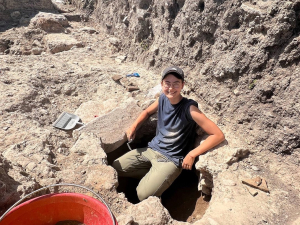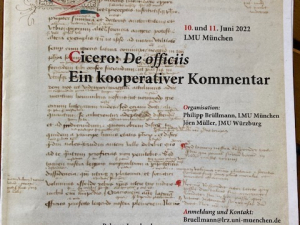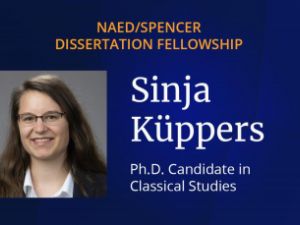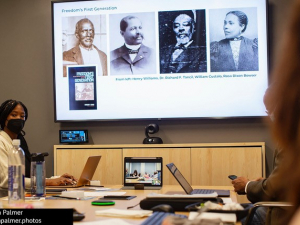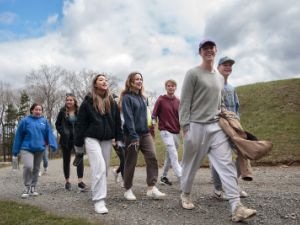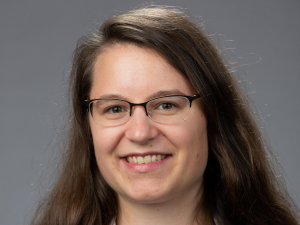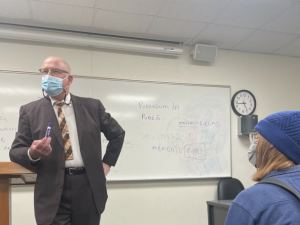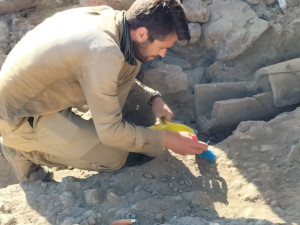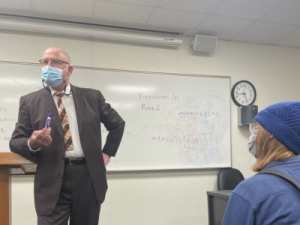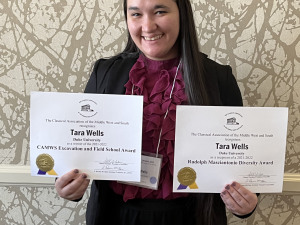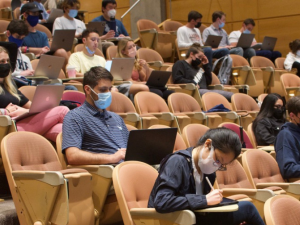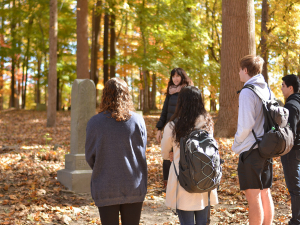I am grateful for the departmental funding that enabled me to participate in the Vulci 3000 Archaeological project, led by Dr. Maurizio Forte, for the first time. As a budding Etruscologist, I was excited to continue my studies of Etruscan civilization at such an important site. The tombs of Vulci’s wealthiest citizens yielded some of antiquity’s most heralded painted vases and other artifacts in centuries past, yet the Vulci 3000 project is the first scientific stratigraphical excavation of the city itself. In this season’… read more about Andrew Welser: Vulci 3000 Archaeological Project »
This summer, I worked with Professor Maurizio Forte in the region of Viterbo, Italy on the Vulci 3000 project. Entering this season, I hoped to further explore my passions for Classics, Computer Science, and digital strides in archaeological fieldwork. For me, archaeology is the natural way to extend my studies outside the classroom. While during the year I spend my time learning about the grammar and culture of ancient civilizations, I hope to spend my summers with my knees bent digging in their footsteps, their roads,… read more about Alex Pieroni: Vulci 3000 Excavation Project »
Transformative Ideas, a new Trinity program for sophomores in partnership with KIE, hosted its first welcome dinner at Parizade. TI students and faculty heard about Fall programming from faculty director Jed Atkins and discussed civil disagreement in the classroom with Teresa Bejan (Oxford) and John Rose (Duke). Theater Studies Professor Doug Jones and TI summer graduate fellow Ejuerleigh Jones enjoy a meal with students at the TI welcome dinner.… read more about Transformative Ideas Welcome Dinner »
Professor Jed Atkins joins Luke Bretherton's "Listen, Organize, Act" podcast to discuss Thucydides' understanding of politics, how he has shaped the history of political thought, and his importance for contemporary democratic politics. https://podcasts.apple.com/us/podcast/listen-organize-act-community-organizing-democratic/id1553824477?i=1000570172412 read more about Jed Atkins on Thucydides and the Athenian-Melian Dialogue »
Professor Emerita Boatwright is one of the scholars quoted in this Live Science article. read more about The Pons Neronianus surfaces in Rome »
This summer, a museum in Italy is displaying the results of a six-year archaeological excavation conducted by more than 20 Duke faculty and students. The exhibit, which opened recently at the Museo delle Antichita Etrusche e Italiche at Sapienza University in Rome, displays findings from Vulci, an Etruscan and Roman archaeological site in Viterbo, Italy. The summer project, a partnership with Sapienza University researchers, leans heavily on virtual reality and digital tools, and the exhibition includes interactive… read more about Digital Exhibit Reveals Buried Roman-Era Secrets Uncovered By Duke Archeologists »
On June 11, Professor Atkins presented a paper on "The Political Theory of Cicero's De officiis" for a conference on the De officiis at the Munich School of Ancient Philosophy. The conference will result in a book entitled "Cicero: De Officiis, Ein kooperativer Kommentar" for the German series Klassiker Auslegen. read more about Professor Atkins Speaks in Munich Conference on Cicero's De officiis »
Congratulations to recent PhD alumnus, Clinton Kinkade, on his appointment as Teacher of Latin at the Newman School. The Newman School is a co-educational private school in Boston, Massachusetts drawing both American and International Students in grades 7-12. Congratulations, Clinton! read more about Congratulations to Clinton Kinkade on Latin Teaching Position »
On May 19, 20 and 21 the Durham Black Burial Grounds Collaboratory (Adam Rosenblatt, Charles Johnson, Khadija McNair, Jenna Smith and Alicia Jiménez) met at Duke with colleagues from the East End Cemetery Collaboratory, from Richmond, Virginia (Jeannine Keefer, Ryan Smith, Brian Palmer, Elizabeth Baughan, Melissa Pocock and Erin Holloway Palmer). The group studied the role of universities in documenting and preserving Black burial grounds as well as good practices in research and teaching at African… read more about Workshop "Universities and African American Cemeteries: Partnerships for Preservation, Research and Teaching" »
Set deep within the Blue Ridge mountains, far from Duke’s campus, a group of almost 40 campers huddled around the campfire ready to discuss the day’s activities. Archery, board games and hiking had kept them busy. But now it was evening, and they were tired and ready to eat s’mores and share typical campfire stories — like dealing with academic stress and deciding on a career path.Well, maybe not so typical, as these weren’t just any campers, but Duke sophomores on a meditative retreat.Soon, they would go back to their… read more about Students Explore Life’s Most Important Questions Through New Program for Sophomores »
Congratulations to Sinja Kuppers who has been named a NAEd/Spencer Dissertation Fellow from the National Academy for Education and the Spencer Foundation. Sinja's Dissertation, "Marginalized Voices and Educational Pathways: A New Perspective on Higher Education in Late Antiquity," aims to write a new chapter in the history of Roman education. ABSTRACT: The scholarship on higher education in the later Roman Empire has focused on the social and intellectual influence of key figures, such… read more about Sinja Kueppers wins National NAEd/Spencer Dissertation Fellowship »
Professor Emeritus Gregson Davis is scheduled to give the prestigious Housman Lecture at University College London on May 18, 2022. Professor Davis' topic is "The reception of Lucretius' "On the Nature of Things" in Aimé Césaire's "Journal of a Homecoming".' For more details, see https://www.eventbrite.co.uk/e/housman-lecture-2022-the-reception-of-lucretius-on-the-nature-of-things-tickets-243071382047 read more about Professor Emeritus Gregson Davis Delivers Housman Lecture 2022 »
As a double major in Chemistry and Classical Languages, senior Sophia Dort realized that though she had taken many courses in both the sciences and the humanities, they rarely overlapped. “When I saw an opportunity to take a class that was focused on medicine, but looking at it from a humanities point of view, I was pretty excited,” she said, explaining how she ended up taking a new course on Medicine and Human Flourishing this spring. The course, cross-listed between Classical Studies, Global Health and Ethics, is part… read more about Class of 2022: Sophia Dort, Reflecting on her Study of ‘Medicine and Human Flourishing’ »
Every word is more than just a word, it is the result of centuries of human history. Words have weathered a tumultuous journey of translation, assimilation, and reformation to end up on this screen in front of you. We can think of words like people. They are more than what you see on the surface; they are the myriad of experiences and ancestors that created that individual word. read more about Why You Should Take Etymology at Duke »
We're happy to congratulate Antonio LoPiano who has won a Research Fellowship from the Etruscan Research Foundation. This fellowship supports Antonio's project, "Mapping the Ancient City of Doganella through Remote Sensing Technologies." It will investigate the development and organization of urban planning in Central Italic society through a remote sensing archaeological survey at the ancient Etruscan city of Doganella. The primary focus of this project will be the completion of two 5 ha survey transects, in the northern… read more about Congratulations to current graduate student, Antonio LoPiano »
Congratulations to recent PhD alumnus Nick Winters (2020, Josh Sosin advising) on his appointment as Assistant Professor of Classics in the Department of Classics at Northwestern University (tenure track). Nick will take up this position in the Fall of 2023 after spending a year as an NEH fellow at the American School for Classical Studies at Athens doing research for his first book on Greek mathematics. Nick's research is a revision of the history of Greek mathematics, which reveals the existence of… read more about Congratulations to PhD alum Nick Winters! »
Congratulations to our graduate student, Tara Wells, who has been recognized by a number of prestigious awards this year! She is the recipient of the Rudolph Mansciantonio Diversity Award from the Classical Association of the Middle West and South. She was also awarded an Excavation and Field School Award from the same society in support of her study of the restoration and analysis of archaeological ceramics at the San Gemini Preservation Studies Program. On top of these awards, Tara ALSO won Eta Sigma Phi's Brent… read more about Congratulations to Tara Wells! »
Congratulations to DOCTOR Tori Lee who defended her dissertation, "Violent by Nature: Danger and Darkness in the Pastoral World." Tori's dissertation challenges the scholarly idea that pastoral literature is an idyllic utopia, arguing instead that danger and violence are innate to the landscape. When we view pastoral through fresh eyes—from a woman’s perspective, for example, or with a critical approach to the scholarly tradition--we see that ancient pastoral literature constructs an environment of continuous violation for… read more about Congratulations to DOCTOR Tori Lee »
A new program for Duke sophomores – which launched earlier this year – will include two Classical Studies courses this fall: “The Good Life: Religion, Philosophy, and Life’s Ultimate Concerns” (CLST 210) and “Medicine and Human Flourishing” (CLST 214). The two courses are part of the new “Transformative Ideas” program that is designed to promote open and civil cross-disciplinary dialogue on questions and big ideas that change lives, link cultures and shape societies around the world. “The Good Life” – taught by… read more about Classical Studies Courses Among Fall “Transformative Ideas” Offerings »
The Cambridge Companion to Cicero's Philosophy, edited by Jed W. Atkins and Thomas Bénatouïl, is now available. This Companion introduces readers to 'Cicero the philosopher' and to his philosophical writings. It provides a handy port-of-call for those interested in Cicero's original contributions to a wide variety of topics such as epistemology, the emotions, determinism and responsibility, cosmopolitanism, republicanism, philosophical translation, dialogue, aging, friendship, and more. The international, interdisciplinary… read more about The Cambridge Companion to Cicero's Philosophy »
Lauren Ginsberg, an associate professor of classical studies and theater studies at Duke, contributed to a new opera that debuted in November 2021 in Vienna. The opera, by composer Michael Hersch with libretto by Stephanie Fleischmann, tells the story of Roman Emperor Nero’s second wife, Poppaea, and her complicated legacy. Ginsberg was commissioned to write an accompanying essay about the history of Poppaea and about the different ways she has been depicted by historians and… read more about Lauren Ginsberg Contributes Story to Hersch's Poppaea »
Lauren Ginsberg, an associate professor of classical studies and theater studies at Duke, contributed to a new opera that debuted in November 2021 in Vienna. The opera, by composer Michael Hersch with libretto by Stephanie Fleischmann, tells the story of Roman Emperor Nero’s second wife, Poppaea, and her complicated legacy. Ginsberg was commissioned to write an accompanying essay about the history of Poppaea and about the different ways she has been depicted by historians and playwrights. She was also… read more about Classics Professor Contributes to New Opera »
Undergraduates enrolled in Prof. Jiménez’s Principles of Archaeology (CLST 144) visited Geer Cemetery on Sunday, Nov. 14, 2021, in the context of the project "Durham Black Burial Grounds Collaboratory", funded through the Duke Endowment to study “Reckoning with Race, Racism, and the History of the American South” (https://facultyadvancement.duke.edu/new-faculty-research-explore-race-south-diverse-angles). Students learned about the segregation of cemeteries, Durham’s African American community, funerary monuments, and how… read more about The Durham Black Burial Grounds Collaboratory »
Congrats to Clinton Kinkade for successfully defending his dissertation yesterday! His dissertation title was Sophocles’ Ancient Readers: The Role of Ancient Scholarship in the Reception of Greek Tragedy. read more about Clinton Kinkade successfully defends his dissertation »


